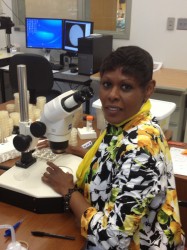A two-year post-doctoral study in a Vanderbilt lab culminated in a $190,000 National Science Foundation grant awarded to Phyllis Freeman, a Fisk University faculty member who studies genetics.

Following her return to Fisk, Freeman will continue to collaborate with Randy Blakely, the Allan D. Bass Professor of Pharmacology and Psychiatry. Her work probes brain chemicals linked to addiction, Parkinson’s Disease and schizophrenia.
The grant was provided through the NSF’s Historically Black Colleges and Universities-Undergraduate Program (HBCU-UP) Research Initiation Awards (RIAs) supporting STEM faculty.
Lee Limbird, a Fisk dean and professor, introduced Blakely and Freeman, associate professor of biology and curriculum coordinator of biology in the Department of Life and Physical Sciences at Fisk. Freeman had an interest in learning strategies to identify and manipulate genes supporting dopamine signaling in C. elegans, the nematode worm.
Freeman worked closely with postdoctoral fellow Sarah Robinson and research assistant Sarah Sturgeon in the Blakely lab.
“It turns out that the lowly worm uses dopamine to coordinate movement and other simple behaviors and it is through studying how the worm controls its dopamine that we hope to learn more about human dopamine-related disorders,” explained Blakely, director of Vanderbilt’s Silvio O. Conte Center for Neuroscience Research and the Postdoctoral Training Program in Functional Neurogenomics.
Freeman’s research focuses on a single protein that provides powerful control over dopamine, called the dopamine transporter, or DAT. Freeman hopes her continued work with C. elegans will uncover clues to the normal control of dopamine that could inform research on its use in handling disorders from Parkinson’s disease to addiction.
The partnership with Fisk through the Fisk-Vanderbilt Masters-to-PhD Bridge Program and other avenues, “presents us with an opportunity to see the results of our efforts impact an under-served community, and to more deeply impact the diversity of the future scientific workforce,” said Blakely.
The two-year post-doctoral experience provided Freeman with first-hand understanding of the scientific process used in the lab, which she in turn can provide to her students and colleagues at Fisk. “[rquote]People like Phyllis are the vital examples needed to give confidence to the underrepresented that science is a path to success, regardless of ethnicity, economic advantage or disability,”[/rquote] Blakely said.
Limbird, a former associate vice chancellor for research and former pharmacology department chair at Vanderbilt, praised Blakely’s mentorship. “Despite his productivity, international research reputation and passionate engagement in teaching, he still makes time to redirect and support the career trajectory of others in the scientific community. Phyllis will have a grand impact on Fisk undergraduates and on their ability to engage in faculty mentored research.”
Limbird, interim dean of the Graduate School at Fisk and adjunct professor of education and medical administration at Vanderbilt University School of Medicine, praised Freeman’s willingness to dive into a two-year leave, saying she “showed great courage in taking this two-year research leave with its embedded expectations for continued productivity.”













